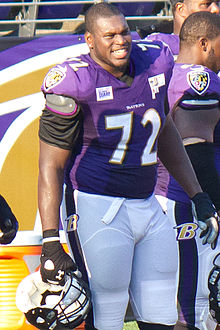The Iowa State Cyclones college football team competes as part of the National Collegiate Athletic Association (NCAA) Division I Football Bowl Subdivision (FBS), and represents Iowa State University in the Big 12 Conference (Big 12). ISU has had 138 players drafted into the National Football League (NFL), since the first draft in 1936, through the 2023 NFL draft.[1] ISU has only seen two players taken in the first round: George Amundson with the 14th overall pick in the 1973 NFL draft by the Houston Oilers, and Will McDonald IV with the 15th overall pick in the 2023 NFL draft by the New York Jets. Troy Davis was drafted in the third round of the 1997 NFL draft by the New Orleans Saints; he has since been inducted into the College Football Hall of Fame. Kelechi Osemele was drafted in the second round of the 2012 NFL draft by the Baltimore Ravens; he went on to win Super Bowl XLVII with the Ravens as their starting right tackle. Six former Cyclones who were drafted have been selected to a Pro Bowl or AFL All-Star Game.

Through the annual NFL Draft, each NFL franchise gets the chance to add new players to their teams. The current draft rules were established in 2009. The team with the worst record the previous year gets to pick first, then the next-worst team picks second, and so on. Teams that were not in the playoffs receive their draft order by their regular-season record. If 2 or more non-playoff teams have the same record, the tie breaker used is their strength of schedule. Playoff teams receive their draft order after all the non-playoff teams, based on their round of elimination (wild card, division, conference, and Super Bowl).[2]
In 1944, the All-America Football Conference was established and it began play in 1946 in direct competition with the NFL. From 1946 to 1949, the two leagues fiercely competed for the top college football prospects with each league holding their own drafts, before the AAFC finally merged with the NFL at the end of the 1949 season.
Like the AAFC earlier, the American Football League (AFL) operated in direct competition with the NFL and held a separate draft. This led to a massive bidding war over top prospects between the two leagues. As part of the merger agreement on June 8, 1966, the two leagues would hold a multiple round "Common Draft". Once the AFL officially merged with the NFL in 1970, the "Common Draft" simply became the NFL Draft.
Key
edit| B | Back | K | Kicker | NT | Nose tackle |
| C | Center | LB | Linebacker | FB | Fullback |
| DB | Defensive back | P | Punter | HB | Halfback |
| DE | Defensive end | QB | Quarterback | WR | Wide receiver |
| DT | Defensive tackle | RB | Running back | G | Guard |
| E | End | T | Offensive tackle | TE | Tight end |
| * | Selected to a Pro Bowl or AFL All-Star Game | ||||
| † | Won an NFL championship | ||||
| ‡ | Selected to a Pro Bowl or AFL All-Star Game and won an NFL championship | ||||
| ! | College Hall of Famer | ||||
| ± | NFL Hall of Famer | ||||
Selections
editNotable undrafted players
editNote: No drafts held before 1920
See also
editNotes
edit- ^ From 1960 through 1966, teams with a superscript AFL denotes a player drafted in the AFL Draft and teams with a superscript NFL denotes a player drafted in the NFL Draft.
- ^ From 1946 through 1949, teams with a superscript AAFC denotes a player drafted in the All-America Football Conference and teams with a superscript NFL denotes a player drafted in the NFL Draft.
- ^ This is the team that drafted the player, not their most recent team.
References
edit- ^ "Iowa St. Drafted Players/Alumni - Pro-Football-Reference.com". Archived from the original on October 18, 2016.
- ^ Clayton, John (March 26, 2009). "Draft order to change for playoff teams". ESPN.com. Archived from the original on February 18, 2010.
- ^ "Colleges Beginning with an I". Drafthistory.com. Retrieved July 4, 2020.